Politics
Let’s get this straight: private healthcare will and must work for the NHS – not the other way around | Polly Toynbee
Our critically injured public services beg for help, but the totem signifying the state of the nation will always be the NHS. The monthly waiting time reports on ambulances, the state of A&E, the wait for cancer or GP appointments: all take the nation’s pulse.
The latest figures showed a twitch of improvement. Can a government only 100 days old claim any credit? Alastair McLellan, the editor of the Health Service Journal, suggests it probably can, as health trusts accelerate activity. But, he says, the £3.2bn elective recovery fund that pays for weekend and evening operations is running dry. Hospitals say they could do more, but only with cash for staff overtime.
Into that arena comes an insidious player, apparently bearing gifts: the private sector big beasts, who have written to the chancellor and the health secretary offering £1bn investment towards clearing the backlog with new surgical and diagnostic units. The Independent Healthcare Providers Network, including Bupa, Circle Health Group and Care UK, proffers 2.5m treatments, “starting in weeks”. So what is that: a gift horse or a Trojan horse? Health secretary Wes Streeting approaches it gingerly. He’s right to.
His team says they wouldn’t turn it down out of hand for ideological reasons. But the nature of these contracts tells us that a £1bn investment expects a handsome payback in solid long-term contracts guaranteeing fixed tariffs and supply of patients. That sounds mightily like a new PFI straitjacket; on PFI, Streeting’s team says: “We learned our lesson last time.” Streeting has red lines: no contract with any private hospitals poaching NHS staff, a tall order since only the NHS trains staff; intensive care beds for difficult cases, no more cherrypicking the easy ones; and any deal must be value for money, which they say “it wasn’t in Covid”. Most private hospitals are in affluent areas: they must treat those in hard-pressed places. While the NHS still has capacity to do more if it gets the money, private care would only be short term in some places. There are myriad issues here, not least that locking into long hospital contracts defies Streeting’s plan to shift patients out of beds and into the community.
Tony Blair used private treatment centres to help cut waiting to its lowest ever, but in dealing with orthopaedic services the private sector charged 11% more, treated younger, richer patients and filled fewer beds than NHS rapid throughput centres, according to the BMJ.
Against this backdrop comes another self-interested bid to profit from the NHS in distress. The British Chambers of Commerce has appealed to the chancellor for tax breaks for private health insurance offered by employers, now taxed as a perk. It is dressed up as a way to stop people falling into sick leave, to “end the worklessness crisis”, but the answer is a flat no. “All public money goes to NHS patients,” says Streeting’s team. Still, they expect the Tories to campaign for it anyway.
To see how private healthcare can undermine the NHS, the fate of ophthalmology under the Tories is a salutary warning: the Centre for Health and the Public Interest finds that outsourcing cataract operations left many NHS eye departments barely viable, losing profitable, less complex operations while left with the complex, expensive work. Staff were stolen and too few routine operations remained to train new eye surgeons.
But there is a great example of reversing that trend. The Maidstone and Tunbridge Wells NHS Trust is one of several hospitals now insourcing from the private sector. Its chief executive, Miles Scott, has just bought a local Spire Healthcare private hospital, renamed Fordcombe hospital, to treat all long waiters in a region that has one in eight people on waiting lists, including thousands waiting more than a year. He persuaded NHS England to pay the £10m. What’s the advantage, I asked? “It was staffed mostly with our doctors, taking simple cases, but sending us back any that went wrong, as they had no critical care. Now we can take 2,500 long waiters. It’s cheaper and better,” he says, with all the staff reemployed by the NHS.
Bath is one of several others that are insourcing private facilities. Chancellor Rachel Reeves said she would unleash the “biggest wave of insourcing in a generation”, while Streeting warns of a “broken” NHS reduced to a “poor service for poor people” if too many go private. How afraid should we be? So long as he sticks to his red lines, not very.
Private healthcare talks a big game, but it’s a minnow alongside the NHS. Despite Tory intentions, NHS cases sent to private hospitals for elective procedures such as hip and knee replacements only rose modestly from 8% pre-pandemic to 10% last year, says the HSJ, and patient flight to the private sector is less than feared.
The Health Foundation charity reports minor increases in people buying private health, mostly for hip replacements. Despite soaring waiting times, there was no “major surge” in private procedures, which only rose from 7.4% pre-pandemic to 8.3% last year. Nor is there a “statistically significant change” in numbers saying they might pay for private healthcare or insurance, consistently less than one in four people. The number of people actually buying care or insurance “has remained relatively stable, at around one in seven people”.
Wooing the government, the Independent Healthcare Providers Network website boasts, “Going private is becoming the new normal”, but it really isn’t. If Labour greatly improves the NHS, as every Labour government has, if all extra funds go to extra NHS work, the private sector will fail to undermine the ethos and values of the NHS. The public holds on to them with remarkable determination. It always has, it always should.
Politics
London mayor halves transport funding request from Budget

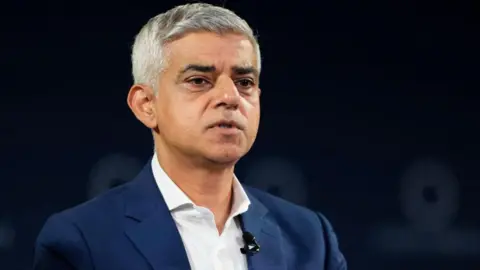 Getty Images
Getty ImagesLondon mayor Sadiq Khan has halved – compared to last year – the minimum amount of money he is asking from the government to fund major transport projects.
The Labour mayor had asked the last Tory government in 2023 for a minimum of £569m to pay for a range of infrastructure upgrades, and complained after receiving only £250m.
Khan told the Local Democracy Reporting Service he now believes it would count as “a win” to receive “anything more than £250m” from the Labour government.
City Hall Tories said the mayor was “watering down” what they claim were “exaggerated financial demands”.
Khan said the reduced funding demand was due to the “£22bn black hole” in public finances cited by the chancellor.
Ahead of the last government’s autumn statement in November last year, Khan had said in a letter to then-Chancellor Jeremy Hunt that Transport for London (TfL) “needs £569m in capital support for 2024/25 to support critical network upgrades and investment in critical road assets”.
He added: “Failure to secure this funding would put vital upgrades at risk and be detrimental to long-term infrastructure investment in the capital’s transport network, with consequential negative impacts on the wider UK economy.”
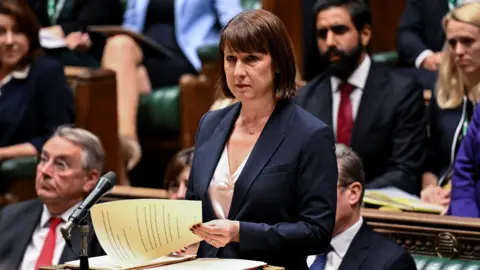 Jessica Taylor/Reuters
Jessica Taylor/ReutersHowever, asked earlier this week what he will be requesting from the new government, Khan said: “I’ll be asking for north of £250m. The £250m we got last year was before the £22bn black hole in the government’s year-to-year expenditure.”
The chancellor’s claim that she had inherited a £22bn gap in the public finances was met with ridicule by her Conservative opponents.
Her predecessor, Hunt, said she would “fool absolutely no one” and accused her of a “shameless attempt” to lay the groundwork for tax rises in her upcoming Budget.
But Khan insisted Reeves had been forced to find ways to “make ends meet”, and said, in that context: “I’ll ask for as much as I can get. But what I’m saying is, a win is getting anything more than £250m.”
He said the “real prize” will be at the spring spending review where he hoped to secure a multi-year deal for funding after the 2025/26 financial year.
Neil Garratt, leader of City Hall Conservatives said: “Last year the mayor said that £500m was the absolute minimum to stop TfL collapsing, but this year he claims that anything ‘north of £250m’ is a win.”
“Consistently under Khan’s mayoralty he made exaggerated financial demands, which made it impossible for a Conservative government to work constructively with him.
“Now that he has a Labour government he can’t get away with that; he’s forced to be honest. What other demands are going to be watered down in the next few years?”
Politics
A big week ahead and a chance for a government reset
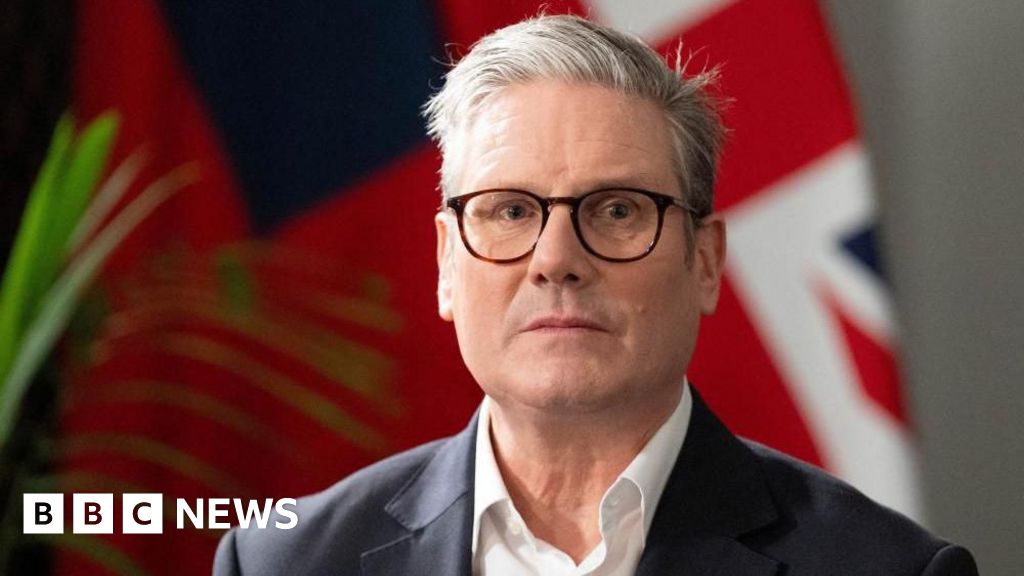
There is a big week ahead.
It will mark the end of the post-election chapter in British politics and the beginning of how the coming years are likely to feel.
A week on Saturday, the Conservatives will elect their new leader.
Rishi Sunak, a symbol of what went before, will finally exit the stage and his successor will enter it – and so become one of the central characters of the years ahead.
And on Wednesday, the highly anticipated and long talked about Budget will be published.
The Conservatives trying to sort themselves out in opposition and the Labour Party trying to sort themselves out in government have defined the four months since the general election.
Incidentally, in the interview I’ve just done with Prime Minister Sir Keir Starmer, he was at his most animated when I put it to him that his party seemed to be struggling to adjust to the realities of government.
Sir Keir leant forward towards me as I read out this list:
“Can I address that head on?” he said, before pointing to the early work the government has done to try to kickstart the economy.
It felt like I had touched a nerve.
Privately there are Labour folk frustrated at what they see as a stuttery start to their time in power.
They hope the next week can reset things – and shape the political landscape ahead.
First, though, for the prime minister – and those like me reporting on him – a body clock-smashing, jet lag-inducing, totally exhausting 20,000-mile round trip to the tropical south Pacific.
Little wonder Sir Keir is the first sitting British prime minister to visit a small Pacific island nation – we were on a plane for 28 hours to get here, and we have still got to get back.
The Commonwealth Heads of Government Meeting happens every other year and is a staple for prime ministers.
Sir Keir told me it was an important event for the UK, with the King and Queen here too – and pointed to the collective economic might of the Commonwealth’s members: a combined economic output of $20tn (£15.4tn).
This region, the Indo-Pacific, is also seen as increasingly economically important to the UK, post-Brexit.
Before we know it, though, the long schlep home will begin – via Hawaii, California and Winnipeg – and Westminster’s tilt towards the Budget will become total.
The confirmation from the chancellor, long hinted at, that the government is re-writing its rules, its choices, on borrowing and debt isn’t a surprise.
Its formal announcement, after weeks and weeks of hints, is part of a strategy to avoid surprises that could spook the markets – remember that is exactly what happened two years ago and it finished off firstly the then-chancellor, Kwasi Kwarteng, and then the prime minister, Liz Truss.
What else can we expect? Some spending cuts and some tax rises, particularly on those seen by the government as relatively well off – some of those, perhaps, who pay capital gains tax, inheritance tax or have significant pension savings, for instance.
They want to take what they see as difficult decisions early, with the next general election miles away.
“I believe in running towards problems,” Sir Keir told me. “If you know what the problem is, what the challenge is, every business knows this, every family knows it, run towards it and fix it.”
The challenge for them will be how that dash towards perceived problems goes down. Does it solve political problems for them, even if someway down the track, or create more?
Is this next chapter in politics one the government can own, shape and dominate, or will they continue to be buffeted by missteps and a new-look but shrivelled opposition opposite them?
Politics
Why the next Tory leader needs to go Cornish

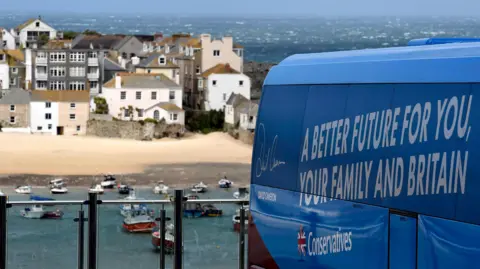 Getty Images
Getty ImagesNext Saturday we will finally find out who the Conservatives have chosen as their next party leader – and the leader of the UK government’s official opposition.
The two contenders, Kemi Badenoch and Robert Jenrick, are both seen as being on the right of the party, and their core messages, on immigration and cultural issues, seem designed to win back support from Nigel Farage’s Reform UK.
But the new leader will also need to do something about the votes the Tories lost to the Liberal Democrats and Labour in July’s general election, if they are going to restore their party’s battered fortunes.
Few parts of the country illustrate the challenge the new leader will face better than Cornwall.
The county used to be a sea of Conservative blue. Until recently, the party held all six Parliamentary seats.
But the tide turned in July’s election, and they were all washed away.
The Tories lost four seats to Labour and two to the Lib Dems, while Reform UK took votes across the board.
In the market town of Liskeard, which sits in a constituency the Tories lost to Labour, Richard Dorling chairs the South East Cornwall Conservative Association and spent time during the election knocking on doors and hearing voters’ concerns.
“They’re looking for people to take charge and reduce immigration and stop the boats, and Reform have a very strong story for that,” he said.
“Whoever gets into the leadership position is going to have to come up with a new plan to tackle that, and get the voters back.”
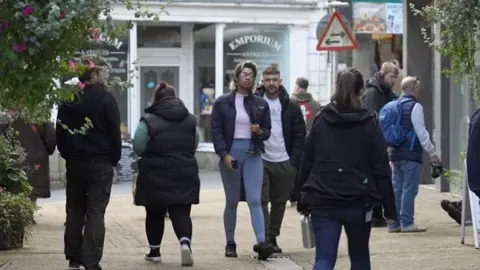
While some Tories argue addressing the concerns of voters attracted to Nigel Farage’s party is crucial, others have warned against tacking to the right to counter the threat posed by Reform UK, for fear it will permanently alienate more centrist former Conservative supporters who turned to Labour or the Lib Dems.
When Kemi Badenoch and Robert Jenrick became the final two candidates, it was widely seen as a signal the party would shift to the political right.
Connor Donnithorne, who stood for the Conservatives in Camborne & Redruth but lost to Labour, said focusing on the party’s position on the political spectrum was the wrong approach.
“You need to be in the common ground of British politics if you want to win,” he said. “That doesn’t mean you have to be in the centre, or the left or right.
“If we go down that path over the next five years, we’re not going to win again because you’re too focused on the internal politics of parties that the overwhelming majority of people in this country don’t actually care about.”

He argues that the party needs to focus on “common ground” issues such as “controlled immigration, lower taxes for working people, and supporting small businesses to create jobs”.
“It’s about having credibility, it’s about being in touch with what people want and it’s about delivering what say you say you’re going to deliver,” he adds.
It’s not just their fractured voting base the new Conservative leader will have to win round.
Kemi Badenoch or Robert Jenrick will have to unite a parliamentary party that’s been publicly arguing over its differences for years – and has been pretty adept at ousting leaders.
In reaching the final two, neither candidate won support from a majority of MPs, so whoever wins will do so knowing only around a third of the parliamentary party backed them.
Nick Craker, a Conservative councillor in Cornwall, said the leadership candidates need to focus on policies that unite the Conservatives rather than those that have the potential to divide them, including Robert Jenrick’s plan to leave the European Convention on Human Rights (ECHR) and “culture wars” confronted by Kemi Badenoch.
“The idea of leaving the ECHR, for example, makes me very nervous,” said Mr Craker.
“I just see that as a really divisive issue that’s going to cause infighting. I just think if you bring something like that forward, there’s going to be at least 50 MPs who are going to be very concerned about it.
“Similarly with some of Kemi’s ideas around gender and race and the culture wars, that makes me a bit nervous, because again she may have some really sound arguments to make on that, but there another 50 MPs at least that have probably got very different views to her and that’s going to just sow a bit more division and infighting.
“And what have we learnt from the last election? Divided parties don’t win.”

Badenoch and Jenrick are currently pitching to the party membership who are casting their ballots in this contest, but it will not be long before one of them will have to start pitching to the country.
In Cornwall, one message reflected by activists is the need for the party leadership to talk to grassroots members of the party who, they say, understand the issues in their communities.
Alison Hernandez, the Conservative Police and Crime Commissioner for Devon and Cornwall, said: “I think they’ve lost their way with being able to connect with members and activists in the party, and I think that needs to change – that connection.”
Of course, whoever leads the Conservative Party after 2 November will do so as a party of opposition – something neither Robert Jenrick or Kemi Badenoch have experienced as MPs.
That makes fighting for relevance harder when airtime and attention doesn’t come as easily.
Ms Hernandez added: “It feels like we’re invisible at the moment on the national stage, and it’s really important we’ve got someone who can embody the values of Conservatism and communicate that to the wider public.”
The Conservative Party is wrestling right now with what those values are, but the bigger question will ultimately be what the public makes of them.
Politics
‘We can’t change our history’ on slave trade, says Keir Starmer

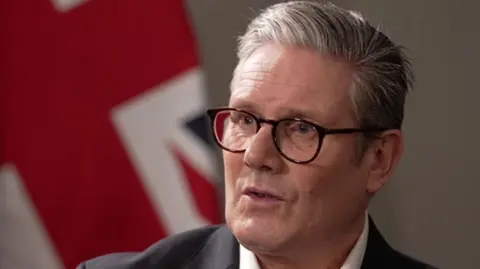 BBC
BBCThe UK “can’t change our history”, Prime Minister Sir Keir Starmer has told the BBC when asked about paying reparations to countries impacted by the transatlantic slave trade.
His comments come after diplomatic sources told the BBC that Commonwealth heads of government want to start a “meaningful conversation” about an issue that could mean the UK paying billions of pounds for its historical role in the trade.
Sir Keir, who is currently in Samoa for a meeting of Commonwealth countries, said the trade was “abhorrent” and that it was important to “talk about our history”.
Chancellor Rachel Reeves ruled out making payments, in an interview earlier on Thursday, saying “that’s not something that this government is doing”.
However, he added that the focus should be on “today’s challenges” including resilience in the face of climate change and boosting trade between Commonwealth nations.
He added he wanted to help member countries work with international financial institutions to “unlock money that might help them” in relation to climate change.
Leaders from 56 countries are attending the Commonwealth Heads of Government Meeting taking place in Samoa on Friday and Saturday.
Commonwealth leaders are expected to defy the UK and debate ways of securing reparations for historical slavery. At its height, Britain was the world’s biggest slave-trading nation. Downing Street has the issue is not on the agenda for the summit.
Reparatory justice for slavery can come in many forms, including financial reparations, debt relief, an official apology, educational programmes, building museums, economic support, and public health assistance.
In the run-up to the summit, there have been growing calls from Commonwealth leaders for the UK to apologise and make reparations.
King Charles will formally open the summit and is expected to use his opening speech to pay tribute to his mother the late Queen Elizabeth II and her connection to the Commonwealth.
He will also say the Commonwealth’s scale and diversity allows it to “discuss the most challenging issues with openness and respect”.
During the gathering, a new Commonwealth secretary general will be elected. All three of the candidates – Shirley Botchwey of Ghana, Joshua Setipa of Lesotho and Mamadou Tangara of Gambia – back reparatory justice.
Speaking to BBC Radio 4’s Today programme, Frederick Mitchell, the foreign minister of the Bahamas, said he believed the UK would change its stance, saying: “It may take a while for people to come around but come around they will.”
During the interview with the BBC, Sir Keir was also asked about a complaint Donald Trump’s team has filed against the Labour Party objecting to its staff and activists volunteering for Kamala Harris’s presidential campaign.
“I think this needs to be seen for what it is,” the prime minister said, adding: “It is some Labour Party members and staff in their free time campaigning.
“It’s happened in every election in different parts of the world. All political parties do it… I think it needs to be put in it’s proper perspective.”
Sir Keir added that both he and Trump wanted to have a “good working relationship” and that the pair recently had dinner together.
He dismissed suggestions that his party were still adjusting to being in government, saying he had “absolute clarity” on his “number one mission” of economic growth.
Next Wednesday Chancellor Rachel Reeves, will set out the government’s tax and spending plans in the Budget.
Ahead of this Reeves told the BBC she would be changing the government’s self-imposed debt rules to free up money for infrastructure spending.
Asked about the Budget, Sir Keir said the economy barely grew under the Conservatives and that he wanted to “clear the decks” and “clear up the mess”.
“I believe in running towards problems. If you know what the problem is, what the challenge is, every business knows this, every family knows it, run towards it and fix it.”
The Conservatives have challenged Labour’s argument that they created a £22bn black hole in the economy and questioned the chancellor’s decision to change the debt rules.
The party’s shadow Treasury minister Gareth Davies said “uncertainty over additional borrowing risks interest rates staying higher and for longer.
“It’s families up and down the country who would pay the price.”
Politics
What could reparatory justice for slavery look like?

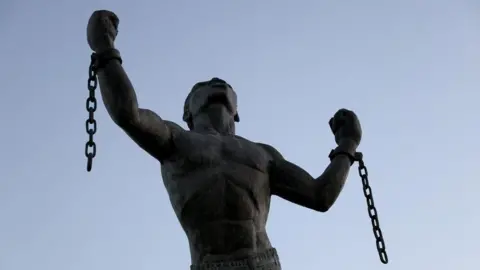 Getty Images
Getty ImagesCalls for the UK to provide reparations for its historic role in the slave trade have reignited ahead of a meeting of Commonwealth countries on Friday.
While Sir Keir Starmer said reparatory justice would not be on the agenda, Commonwealth leaders have defied the prime minister and plan to move towards a “meaningful conversation” on the issue.
The UK has long faced calls to provide reparations for its role in the Atlantic slave trade which saw millions of Africans enslaved and forced to work, largely on plantations in the Caribbean and Americas.
The chancellor told the BBC the UK would not be “paying out” reparations – but might there be other forms of reparations to consider, and how likely is it that the UK would commit to them?
Reparations are measures to make amends for past actions deemed wrong or unfair.
From 1500, the British government and the monarchy were prominent participants in the centuries-long slave trade, alongside other European nations.
Britain also had a key role in ending the trade, through Parliament’s passage of a law to abolish slavery in 1833.
As part of that law, British plantation owners were paid for the loss of their slaves, to the tune of some £20m.
The UK only finished paying off the debt it incurred to cover the payments in 2015.
Reparations for the benefit of those who suffered as result of slavery can take many forms, from financial to symbolic.
The United Nations says they must be “proportional to the gravity of the violations and the harm suffered”.
Here are some of the forms they can take.
Money
This is the most commonly understood form of reparatory justice – where a state gives money to a country whose communities it enslaved.
A 2023 report co-authored by a United Nations’ judge concluded that the UK owed more than £18tn to 14 countries in reparations.
The difficulty is that most European countries would struggle to find sums as astronomic as that.
The UK government, for example, spends a total of about £1.2tn every year.
Even if governments could find the money, it would be politically unpopular to spend so much on reparations and consequently less on schools and hospitals at home.
Some campaigners answer these points by saying reparations could be paid over time.
But many demands for straight cash payments are considered unfeasible by Western governments.
So for others, the debate about financial reparations often focuses instead on the question of debt relief.
Many developing countries which suffered from slavery owe large sums to Western countries.
The cancellation or reduction of that debt could lift a massive economic burden from a developing country at little political cost for a donor country.
Apology
On the face of it, this could appear relatively straightforward.
It does not cost anything, just a public act of atonement for past sins.
Some institutions – such as the Church of England – have apologised for links to slavery.
The difficulty, though, is that apologies can sometimes act as a declaration of legal responsibility for which there could be a financial cost.
Which is why states are often reluctant to take that step.
Earlier this week, former Prime Minister Tony Blair suggested it was wrong for states to apologise for historic wrongs – despite himself saying “sorry” in 2007.
“You can go back over history, and you end up in a completely absurd position”, he told Newsweek on Wednesday.
“The most important thing we can do for countries that have been marked by colonialism is to help them now.”
Few states that played a historic role in the slave trade have taken steps towards reparations.
Education
This includes educational institutions acknowledging their own connection to slavery and how they might have profited from the slave trade.
It can also involve teaching the history of slavery, as well as creating institutions for the study of slavery.
There are also calls for supporting schools to tackle low literacy levels and other issues that some argue date back to the slave trade.
Some campaigners say school exchanges and cultural tours would also be beneficial.
The countries pushing hardest for reparatory justice from the UK are in the Caribbean – and their collective organisation, known as Caricom, has its own reparations commission with 10 demands.
Three of these deal explicitly with education and culture, saying a “restoration of historical memory” was required.
Caricom said states involved in the slave trade had a responsibility to “build educational capacity and provide scholarships”.
Health
Some argue that reparatory justice should also include health – where European countries fund clinics and hospitals.
Medical evidence shows a high rate of type 2 diabetes in the Caribbean which some suggest is associated with centuries of poor nutrition due to past enslavement.
Historian Sir Hilary Beckles told the United Nations’s UN News earlier this year: “If you look at countries with the greatest incidence of chronic diseases, black people have the highest proportions of diabetic adult patients in the world.”
He argued high rates of diabetes on his own island of Barbados “cannot be a coincidence” given it was “the first island to have an African majority and an enslaved population”.
Barbados’ government has moved toward exploring the historic impact of slavery on its population’s health.
Caricom is calling for European countries to invest in science, technology and capital toward improving hospitals, healthcare, and mental health support for the descendants of enslaved people.
Is the UK likely to provide reparations?
The UK government has never formally apologised for slavery or offered to pay reparations – and Sir Keir Starmer has not shown any intention to break the mould.
It is not Labour Party policy to introduce reparations.
Ahead of the Commonwealth summit, the prime minister explicitly said he would not provide an apology or financial compensation for slavery.
He said he wanted to focus on present issues, like the climate, rather than the past.
Chancellor Rachel Reeves doubled down on Thursday afternoon, insisting the UK would not be paying reparations.
“I’d rather roll up my sleeves and work… on the current future-facing challenges than spend a lot of time on the past”, she said.
In 2023, then Prime Minister Rishi Sunak likewise refused to provide compensation or an apology for the slave trade.
“Trying to unpick our history is not the right way forward”, he said.
Politics
Victims concerned over missing Windrush reform
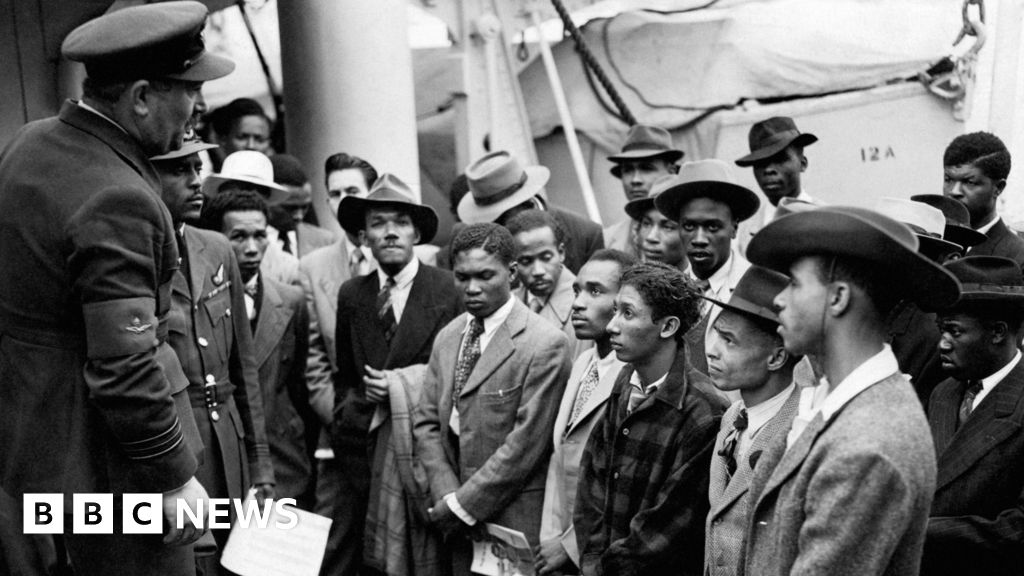
Windrush campaigners have expressed concern that the home secretary has yet to announce when she will implement a key recommendation from the government’s review.
On Thursday, Yvette Cooper announced an additional £1.5m of funding to help victims apply for compensation overseen by a Windrush Commissioner – but did not hand over recommended powers to a watchdog.
Campaigners told the BBC they were happy with Labour’s approach, but thought the new system lacked “teeth”.
A Home Office source described the changes as the “first set of announcements on Windrush since the election,” adding that the focus had been on priorities highlighted by campaigners and victims.
The Windrush Review’s report, published by Wendy Williams in 2020, made 30 recommendations which were all adopted by then home secretary Priti Patel.
But in January 2023, her successor Suella Braverman dropped three of them, including establishing a migrants’ commissioner role and giving the immigration watchdog – the Independent Chief Inspector of Borders and Immigration – the power to publish its own reports.
The watchdog currently has the power to carry out investigations, but the findings can only be published by the home secretary.
Following a legal challenge by Windrush victim Trevor Donald, a judge in June condemned Braverman’s actions as “conspicuously unfair”.
On Thursday, Cooper announced a Windrush commissioner would be appointed, but did not mention the Independent Chief Inspector of Borders and Immigration.
In February the then-chief inspector David Neal was sacked for leaking reports he had written that he claimed the Home Office was sitting on.
At the time, Cooper who was still in opposition said a “series of Conservative home secretaries have sought to bury uncomfortable truths revealed by the chief inspector”.
On Thursday, Cooper said she was “changing the government’s approach” to “ensure a scandal of this kind can never happen again and dignity can be restored to those so tragically affected”.
A Home Office source said this was the “first set of announcements on Windrush since the election” and said the focus had been on priorities raised by campaigners and victims.
They indicated that a new Windrush Unit, also announced today, could look at how to implement the final recommendation.
Following today’s announcement Cooper met representatives of Windrush campaign groups.
Some of those present welcomed the tone of the home secretary and said the new government appeared to “get” what it was that campaigners were looking for.
But they said there was no mention of when the Home Office would look at more powers for the chief inspector.
One said that the chief inspector needs to “have teeth” and be able to hold ministers to account “in a proper way”.
They said today’s meeting “marked the beginning” of relations between the new Labour government.
Campaigners said that Cooper had made it clear there were still parts of the Home Office that needed to change.
Another said the meeting was “uplifting” compared to ones held with Conservative ministers, but said the chief inspector “needs to be able to publish its findings” in order to prevent a similar scandal happening again.
The Windrush scandal emerged in 2018 when Commonwealth citizens, mostly from the Caribbean, were wrongly detained, deported or threatened with deportation despite having the right to live and work in the UK.
It was discovered that the Home Office had kept no records of those granted permission to stay and had not issued the paperwork they needed to confirm their status.
Many lost homes and jobs and were denied access to healthcare and benefits.
The government apologised in 2018, when it launched the Williams’ review.
-

 Technology4 weeks ago
Technology4 weeks agoIs sharing your smartphone PIN part of a healthy relationship?
-

 Science & Environment1 month ago
Science & Environment1 month agoHow to unsnarl a tangle of threads, according to physics
-

 Science & Environment1 month ago
Science & Environment1 month agoHyperelastic gel is one of the stretchiest materials known to science
-

 Science & Environment1 month ago
Science & Environment1 month ago‘Running of the bulls’ festival crowds move like charged particles
-

 Science & Environment1 month ago
Science & Environment1 month agoMaxwell’s demon charges quantum batteries inside of a quantum computer
-

 Technology1 month ago
Technology1 month agoWould-be reality TV contestants ‘not looking real’
-

 Science & Environment4 weeks ago
Science & Environment4 weeks agoX-rays reveal half-billion-year-old insect ancestor
-

 Science & Environment1 month ago
Science & Environment1 month agoSunlight-trapping device can generate temperatures over 1000°C
-

 Technology4 weeks ago
Technology4 weeks agoUkraine is using AI to manage the removal of Russian landmines
-

 Science & Environment1 month ago
Science & Environment1 month agoLiquid crystals could improve quantum communication devices
-

 Science & Environment1 month ago
Science & Environment1 month agoQuantum ‘supersolid’ matter stirred using magnets
-

 TV3 weeks ago
TV3 weeks agoসারাদেশে দিনব্যাপী বৃষ্টির পূর্বাভাস; সমুদ্রবন্দরে ৩ নম্বর সংকেত | Weather Today | Jamuna TV
-

 Football3 weeks ago
Football3 weeks agoRangers & Celtic ready for first SWPL derby showdown
-

 Science & Environment1 month ago
Science & Environment1 month agoLaser helps turn an electron into a coil of mass and charge
-

 Science & Environment1 month ago
Science & Environment1 month agoA new kind of experiment at the Large Hadron Collider could unravel quantum reality
-

 Womens Workouts1 month ago
Womens Workouts1 month ago3 Day Full Body Women’s Dumbbell Only Workout
-

 News3 weeks ago
News3 weeks agoMassive blasts in Beirut after renewed Israeli air strikes
-

 News3 weeks ago
News3 weeks ago▶ Hamas Spent $1B on Tunnels Instead of Investing in a Future for Gaza’s People
-

 Technology3 weeks ago
Technology3 weeks agoSamsung Passkeys will work with Samsung’s smart home devices
-

 Business3 weeks ago
Business3 weeks agoWhen to tip and when not to tip
-

 Sport3 weeks ago
Sport3 weeks agoBoxing: World champion Nick Ball set for Liverpool homecoming against Ronny Rios
-

 News3 weeks ago
News3 weeks agoNavigating the News Void: Opportunities for Revitalization
-

 MMA3 weeks ago
MMA3 weeks ago‘Uncrowned queen’ Kayla Harrison tastes blood, wants UFC title run
-

 Technology4 weeks ago
Technology4 weeks agoMicrophone made of atom-thick graphene could be used in smartphones
-

 Sport3 weeks ago
Sport3 weeks agoMan City ask for Premier League season to be DELAYED as Pep Guardiola escalates fixture pile-up row
-

 Science & Environment1 month ago
Science & Environment1 month agoWhy this is a golden age for life to thrive across the universe
-

 Science & Environment1 month ago
Science & Environment1 month agoPhysicists have worked out how to melt any material
-
Business3 weeks ago
DoJ accuses Donald Trump of ‘private criminal effort’ to overturn 2020 election
-

 MMA3 weeks ago
MMA3 weeks agoPereira vs. Rountree prediction: Champ chases legend status
-

 Sport3 weeks ago
Sport3 weeks agoWales fall to second loss of WXV against Italy
-

 News3 weeks ago
News3 weeks ago‘Blacks for Trump’ and Pennsylvania progressives play for undecided voters
-

 Science & Environment1 month ago
Science & Environment1 month agoQuantum forces used to automatically assemble tiny device
-

 Science & Environment1 month ago
Science & Environment1 month agoA slight curve helps rocks make the biggest splash
-

 News1 month ago
News1 month ago▶️ Hamas in the West Bank: Rising Support and Deadly Attacks You Might Not Know About
-

 Science & Environment1 month ago
Science & Environment1 month agoNerve fibres in the brain could generate quantum entanglement
-

 Technology1 month ago
Technology1 month agoMeta has a major opportunity to win the AI hardware race
-

 MMA3 weeks ago
MMA3 weeks agoJulianna Peña trashes Raquel Pennington’s behavior as champ
-

 MMA3 weeks ago
MMA3 weeks agoDana White’s Contender Series 74 recap, analysis, winner grades
-

 Technology3 weeks ago
Technology3 weeks agoMusk faces SEC questions over X takeover
-

 Technology3 weeks ago
Technology3 weeks agoThis AI video generator can melt, crush, blow up, or turn anything into cake
-

 Football3 weeks ago
Football3 weeks agoWhy does Prince William support Aston Villa?
-

 Sport3 weeks ago
Sport3 weeks agoSturm Graz: How Austrians ended Red Bull’s title dominance
-

 News3 weeks ago
News3 weeks agoFamily plans to honor hurricane victim using logs from fallen tree that killed him
-

 Sport3 weeks ago
Sport3 weeks agoAaron Ramsdale: Southampton goalkeeper left Arsenal for more game time
-

 Science & Environment1 month ago
Science & Environment1 month agoITER: Is the world’s biggest fusion experiment dead after new delay to 2035?
-

 Science & Environment1 month ago
Science & Environment1 month agoHow to wrap your mind around the real multiverse
-

 Science & Environment1 month ago
Science & Environment1 month agoNuclear fusion experiment overcomes two key operating hurdles
-

 Technology1 month ago
Technology1 month agoWhy Machines Learn: A clever primer makes sense of what makes AI possible
-

 Technology4 weeks ago
Technology4 weeks agoRussia is building ground-based kamikaze robots out of old hoverboards
-

 Science & Environment1 month ago
Science & Environment1 month agoTime travel sci-fi novel is a rip-roaringly good thought experiment
-

 News1 month ago
News1 month ago▶️ Media Bias: How They Spin Attack on Hezbollah and Ignore the Reality
-

 Money3 weeks ago
Money3 weeks agoWetherspoons issues update on closures – see the full list of five still at risk and 26 gone for good
-
Business3 weeks ago
Sterling slides after Bailey says BoE could be ‘a bit more aggressive’ on rates
-

 Technology3 weeks ago
Technology3 weeks agoMicrosoft just dropped Drasi, and it could change how we handle big data
-

 Sport3 weeks ago
Sport3 weeks agoChina Open: Carlos Alcaraz recovers to beat Jannik Sinner in dramatic final
-

 Technology3 weeks ago
Technology3 weeks agoThe best budget robot vacuums for 2024
-

 Sport3 weeks ago
Sport3 weeks agoCoco Gauff stages superb comeback to reach China Open final
-

 Sport4 weeks ago
Sport4 weeks agoWorld’s sexiest referee Claudia Romani shows off incredible figure in animal print bikini on South Beach
-
Business3 weeks ago
Bank of England warns of ‘future stress’ from hedge fund bets against US Treasuries
-

 Business3 weeks ago
Business3 weeks agoChancellor Rachel Reeves says she needs to raise £20bn. How might she do it?
-

 Technology3 weeks ago
Technology3 weeks agoGmail gets redesigned summary cards with more data & features
-

 Technology3 weeks ago
Technology3 weeks agoTexas is suing TikTok for allegedly violating its new child privacy law
-

 MMA3 weeks ago
MMA3 weeks agoPereira vs. Rountree preview show live stream
-

 Technology3 weeks ago
Technology3 weeks agoThe best shows on Max (formerly HBO Max) right now
-

 Sport3 weeks ago
Sport3 weeks ago2024 ICC Women’s T20 World Cup: Pakistan beat Sri Lanka
-

 Entertainment3 weeks ago
Entertainment3 weeks agoNew documentary explores actor Christopher Reeve’s life and legacy
-

 MMA3 weeks ago
MMA3 weeks agoAlex Pereira faces ‘trap game’ vs. Khalil Rountree
-

 News3 weeks ago
News3 weeks agoWoman who died of cancer ‘was misdiagnosed on phone call with GP’
-

 News3 weeks ago
News3 weeks agoGerman Car Company Declares Bankruptcy – 200 Employees Lose Their Jobs
-

 MMA3 weeks ago
MMA3 weeks agoUFC 307 preview show: Will Alex Pereira’s wild ride continue, or does Khalil Rountree shock the world?
-

 MMA3 weeks ago
MMA3 weeks ago‘I was fighting on automatic pilot’ at UFC 306
-

 MMA3 weeks ago
MMA3 weeks agoKetlen Vieira vs. Kayla Harrison pick, start time, odds: UFC 307
-
News1 month ago
the pick of new debut fiction
-

 News1 month ago
News1 month agoOur millionaire neighbour blocks us from using public footpath & screams at us in street.. it’s like living in a WARZONE – WordupNews
-

 Technology3 weeks ago
Technology3 weeks agoEpic Games CEO Tim Sweeney renews blast at ‘gatekeeper’ platform owners
-

 Football3 weeks ago
Football3 weeks agoSimo Valakari: New St Johnstone boss says Scotland special in his heart
-

 News3 weeks ago
News3 weeks agoHull KR 10-8 Warrington Wolves – Robins reach first Super League Grand Final
-

 Business3 weeks ago
Business3 weeks agoStark difference in UK and Ireland’s budgets
-

 News3 weeks ago
News3 weeks agoBalancing India and China Is the Challenge for Sri Lanka’s Dissanayake
-

 News3 weeks ago
News3 weeks agoHeavy strikes shake Beirut as Israel expands Lebanon campaign
-

 TV3 weeks ago
TV3 weeks agoLove Island star sparks feud rumours as one Islander is missing from glam girls’ night
-

 Technology3 weeks ago
Technology3 weeks agoJ.B. Hunt and UP.Labs launch venture lab to build logistics startups
-

 TV3 weeks ago
TV3 weeks agoPhillip Schofield accidentally sets his camp on FIRE after using emergency radio to Channel 5 crew
-

 Technology3 weeks ago
Technology3 weeks agoOpenAI secured more billions, but there’s still capital left for other startups
-
Business3 weeks ago
Head of UK Competition Appeal Tribunal to step down after rebuke for serious misconduct
-
Business3 weeks ago
The search for Japan’s ‘lost’ art
-

 Science & Environment3 weeks ago
Science & Environment3 weeks agoMarkets watch for dangers of further escalation
-

 News3 weeks ago
News3 weeks agoHeartbreaking end to search as body of influencer, 27, found after yacht party shipwreck on ‘Devil’s Throat’ coastline
-

 Technology3 weeks ago
Technology3 weeks agoApple iPhone 16 Plus vs Samsung Galaxy S24+
-

 TV3 weeks ago
TV3 weeks agoMaayavi (මායාවී) | Episode 23 | 02nd October 2024 | Sirasa TV
-

 Technology3 weeks ago
Technology3 weeks agoPopular financial newsletter claims Roblox enables child sexual abuse
-

 Health & fitness3 weeks ago
Health & fitness3 weeks agoNHS surgeon who couldn’t find his scalpel cut patient’s chest open with the penknife he used to slice up his lunch
-

 Money3 weeks ago
Money3 weeks agoPub selling Britain’s ‘CHEAPEST’ pints for just £2.60 – but you’ll have to follow super-strict rules to get in
-

 Technology3 weeks ago
Technology3 weeks agoIf you’ve ever considered smart glasses, this Amazon deal is for you
-

 News3 weeks ago
News3 weeks agoLiverpool secure win over Bologna on a night that shows this format might work
-

 Technology3 weeks ago
Technology3 weeks agoAmazon’s Ring just doubled the price of its alarm monitoring service for grandfathered customers
-
Politics3 weeks ago
Rosie Duffield’s savage departure raises difficult questions for Keir Starmer. He’d be foolish to ignore them | Gaby Hinsliff
-
Business3 weeks ago
Can liberals be trusted with liberalism?
-

 Technology3 weeks ago
Technology3 weeks agoA very underrated horror movie sequel is streaming on Max
-

 Science & Environment1 month ago
Science & Environment1 month agoPhysicists are grappling with their own reproducibility crisis


You must be logged in to post a comment Login